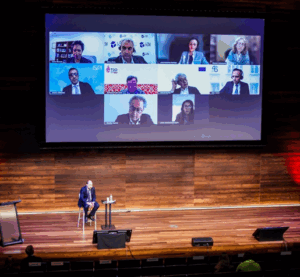The Summit focused on transformative technologies, the digital economy, sustainability and global peace. Experts warned against cutting development investment, stressing the need for strategic alliances and international cooperation to build a sustainable, cooperative future.

On 1 and 2 April, the Centre for International Governance and Innovation (CIGI) hosted the hybrid Think 7 Summit. Over one and a half days, T7 Task Force members, think tank leaders, policy makers, scholars and civil society representatives came together to build on the foundation of policy briefs developed in the task forces and sharpen the ideas developed for the upcoming T7 Final Communiqué to the G7. The discussions were framed by the four thematic areas that constitute T7 task force domains: Transformative Technologies — AI and Quantum, Digitalisation of the Global Economy, Environment, Energy and Sustainable Development, Global Peace and Security.

Prof. Anna-Katharina Hornidge gave an input for the overarching session on “The World in 2025 – Building International Cooperation”, alongside Elizbeth Sidiropoulous from SAIIA as representative of T20 South Africa, Antonio Villafranca, ISPI, and Ettore Greco, IAI as representatives of T7 Italy 2024 and Marc Hecker, Ifri as representative of T7 France 2026, and others. She warned against current tendencies in Germany and other countries to scale back investment in development policy. Understood as international cooperation policy, development policy is crucial to build a cooperative world which enables sustainable futures and must be invested in alongside military emancipation. She also highlighted the importance of building strategic alliances with and strengthening democratic middle and regional powers neighbouring big power states.
Schreibe einen Kommentar